Meet the people in Chiang Mai riding high on the legalization of marijuana in Thailand
Marielle Descalsota

- Thailand decriminalized the use of marijuana in June last year.
- Recreational dispensaries launched across the country as chefs infused the plant in food.
In June last year, Thailand became the first country in Southeast Asia to decriminalize the use of marijuana. It comes after decades of being classified as a Category 5 drug.
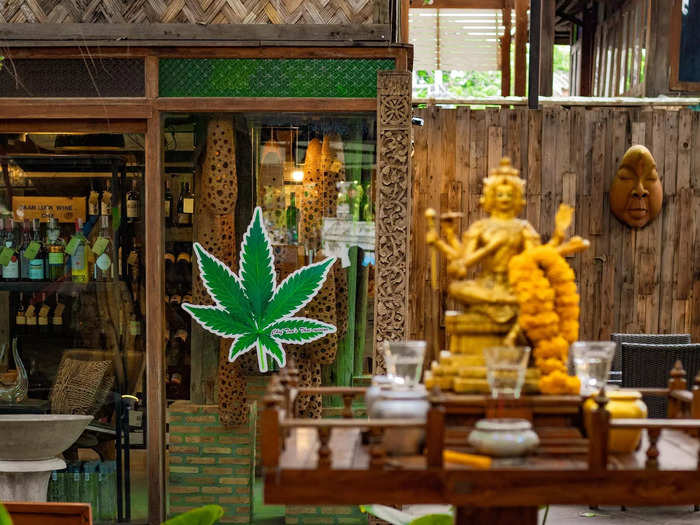
Cannabis, also known as marijuana, has had a long history in Thailand. Traditionally, the plant was used by locals in their food and medicine.
But in 1935, using marijuana — whether as a drug or otherwise — was criminalized. And until last year, anyone using or possessing marijuana could face five years in prison, and a fine of up to 100,000 Thai baht, or $2,900.
In the late 2010s, the Thai government appeared to soften their stance towards marijuana. It was approved for medicinal use in 2019. Just two years later, those with a license could use and grow the plant.
The marijuana industry in Thailand is a fast growing market and a cash crop that's expected to be worth $661 million by 2024, per a report by market research firm Prohibition Partners.
Last June, to rile up interest in marijuana, Thai government gave away a million cannabis plants to locals. Businesses, too, began riding on this newfound opportunity — and that included the famed five-star luxury hotel chain Anantara in Chiang Mai, which then built a clientele with the country's first-ever marijuana-infused spa packages.
And these were just a few of the ways Thailand began building a tourism landscape around marijuana. Chiang Mai, the largest city in the north, is one of the places where these changes are most visible.
Just a few weeks after its legalization, Insider traveled to the northern city and spoke to three owners of dispensaries and restaurants to see what it's like to be on the forefront of marijuana tourism in Thailand.
Shawn Healy and Amanda Gedney are Americans who run Green Dog, a marijuana dispensary, in Chiang Mai.
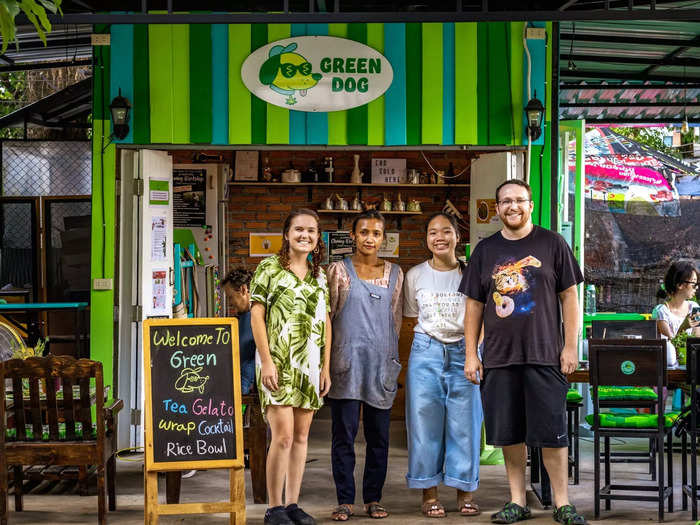
Healy and Gedney first moved to Thailand in 2016. Before traveling to Thailand, the couple were university students and had part-time jobs. Healy worked at an animal hospital, while Gedney had a job in the fashion industry.
A New York native, Gedney said she started taking cannabidiol, or CBD, to help with her stomach pains.
"I used to take a lot of medications in the US. But since coming to Thailand, I haven't taken any medication," Gedney said, adding that she became a firm believer in the health benefits of CBD.
Healy, who's from Malboro, New Jersey, used marijuana when he lived in the US, but never sold it or worked in a dispensary.
In 2021, Healy, 29, and Gedney, 28, launched Green Dog with several Thai partners. The dispensary, which is located in an art space in Chiang Mai, is housed in a bright green hut.
The shop sells weed, bongs, and, at one point in time, food made with hemp leaves.
When Insider visited Green Dog in July, several foreigners, mostly from countries where marijuana is criminalized, spent time curiously taking photos and perusing the paraphernalia on display. A few regulars, mostly expats, also dropped by to order their weekly dose of weed.
Healy and Gedney source most of the shop's marijuana from local farms. As the marijuana industry is still a growing market in Thailand, its products can be expensive. Healy said that an ounce of cannabis plant's flower — called hemp — costs up to 20,000 baht, or around $585. High quality cannabis in Thailand is grown in an air-conditioned indoor farm using grow lights and moderated soil.
Green Dog was one of the first shops in Chiang Mai to introduce a menu with marijuana, which, at the time, was still loosely regulated in Thailand. Today, restaurants need to be licensed to serve marijuana infused into food.
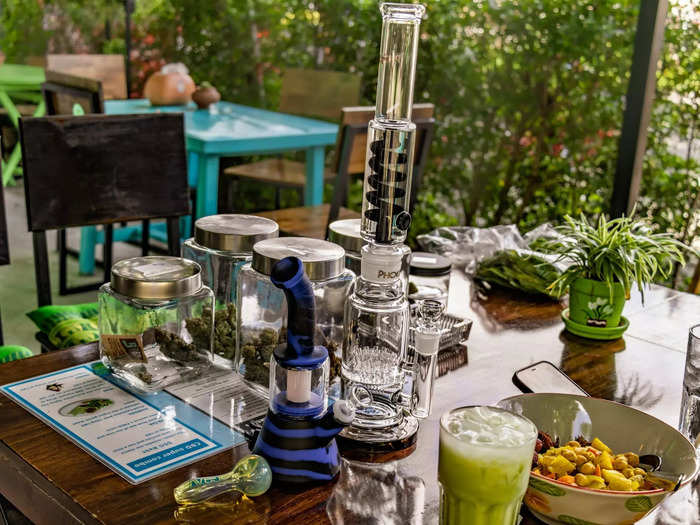
Some of the notable dishes the shop once sold include fried marijuana leaves, gelato with cannabis seeds, and rice bowls with fan leaves.
"A few things have changed and we are no longer allowed to sell prepared food and cannabis in the same building," Healy told Insider via text message in March, adding that his shop doesn't sell marijuana-based food anymore.
But the shop still sells marijuana-infused beverages, which continue to remain popular among the shop's customers. Dried hemp leaf tea, which is tea infused with dried leaves from the male cannabis plant, is the shop's best seller as it helps soothe their customers, Gedney said.
"We want people to be able to spend the whole day not worrying, and to just relax," she added.
Tao is the owner and head chef of Cannabis Cafe, a dispensary and restaurant that serves a menu made with marijuana.
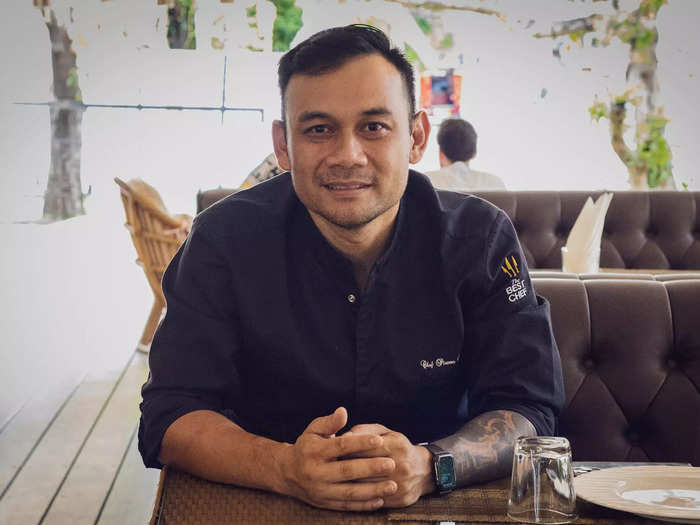
Tao, a Thai chef, opened Cannabis Cafe in 2021. At that time, before marijuana was decriminalized for recreational use, there were many rules. He has a fine dining background: previously, he worked as an executive chef at the Four Seasons in Chiang Mai and competed in Thailand's version of "Iron Chef."
"Before this, we could only use the leaves, stem, and the root. Everyone said it's bullshit," he said, adding that before marijuana was legalized, restaurants only used the leaves as a garnish or decoration.
Tao, who specializes in northern Thai cuisine, started selling weed and infusing marijuana into his food to ride on the growing wave of marijuana tourism in Chiang Mai. As a fine dining chef, Tao thought of ways to use tetrahydrocannabinol, or THC, — the main psychoactive element in marijuana — and CBD in his food. When Tao first cooked with THC, he was surprised at how much it enhanced the food.
"I feel like, okay, the trend is coming. Cannabis is becoming popular," he said, explaining that the legalization of marijuana made a major difference to how it's sold and consumed.
"Eating the leaf — there's no effect. When I cooked with THC, I was wowed," he continued.
At the time, there were limitations at how much THC can be used in food and drinks — 0.2% and 0.5% respectively, Tao said. According to a 2023 article by the Tourism Authority of Thailand, extracts containing over 0.2% THC requires permission from Thai authorities before being used.
At first, this was a challenging task.
"If the customers become very high, we stop selling it," Tao said, adding that he aims for consistency when it comes to the quality and safety of his food.
"We use very little — just a touch of cannabis," he added.
Despite running one of Chiang Mai's most popular marijuana-inspired restaurants, Tao said that he doesn't smoke weed.
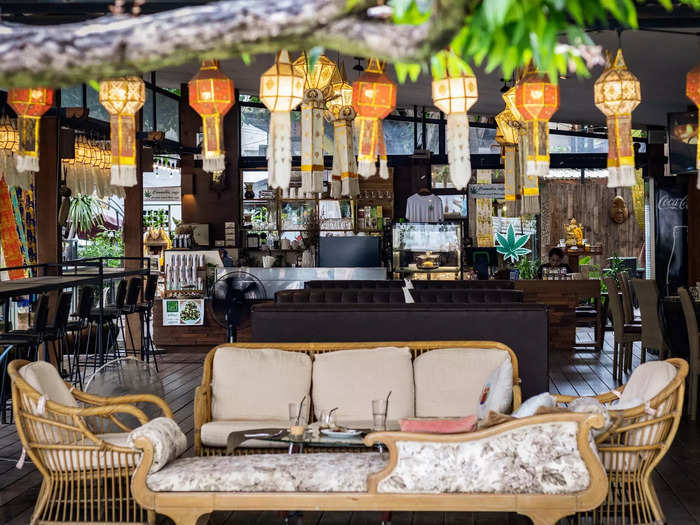
Tao said there remains a stigma about marijuana among Thais, and, like him, most refrain from using or ingesting it. Most of his clientele are expats and tourists from the West, Tao said, as local attitudes aren't as progressive.
"The Western people, they love cannabis. They know it's not a drug. But Thai people don't understand what cannabis is — they still think it's a drug," he said, adding that "some people feel paranoid about it."
Tao's restaurant is popular for serving a chef's table-style dinner. He typically customizes the food according to his customers' requests — and is more than willing to experiment with marijuana.
"If they request a specific cuisine, for example Western, I can make it," adding that a common way he uses cannabis is by infusing it into butter, coconut, and even flour.
But Tao warns that he is careful to serve food that's well-prepared and made with high quality cannabis products.
"When we serve something, we have to be responsible," Tao said, adding that he doesn't want to "kill" his customers.
In addition to his marijuana-based cuisine, Tao also runs a dispensary. He said there's one rule when taking weed at his restaurant.
"Some people ask if they can use the bong. I say no, because it doesn't make my business look good," Tao said, adding that patrons can smoke, but only with blunts.
"We have to keep the image — this is how we want to present to the customer," he said.
Ball Chayakul is the co-owner of Stoner CNX, a marijuana dispensary in Chiang Mai.
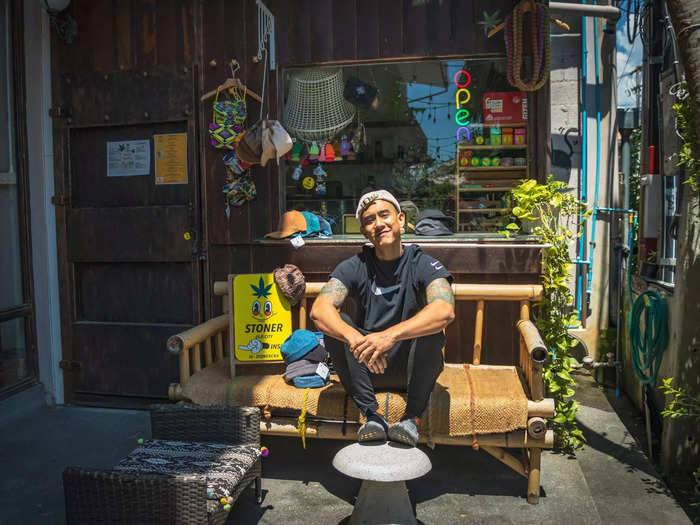
Chayakul grew up in Chiang Mai before leaving to study in the US. Dressed in baggy, all-black clothing that reveals his colorful tattoos, many might not have guessed that before owning a dispensary, Chayakul was as singer and musician and a business school graduate.
"I only let happy people in my shop," Chayakul said, greeting customers with a smile.
He opened Stoner CNX on the day Thailand decriminalized marijuana, in June last year.
Most of Chayakul's clientele are tourists, who come to him for hemp, which can be smoked. Several of his customers come from countries where marijuana is banned — he said many of them are "stoners" who come to Thailand to smoke weed.
He believes one of the reasons why cannabis is gaining popularity in Chiang Mai is the relaxed vibe of the city.
"Tourists are very happy about it," Chayakul said, adding that many were surprised Thailand legalized it for recreational use.
"In the first few weeks they weren't sure about buying it — they didn't know it was legal until they got here. They were scared they were going to get arrested," he continued.
Chayakul's shop is a small shed hidden behind a popular cafe. Inside, it's a colorful display of different kinds of hemp and smoking paraphernalia.
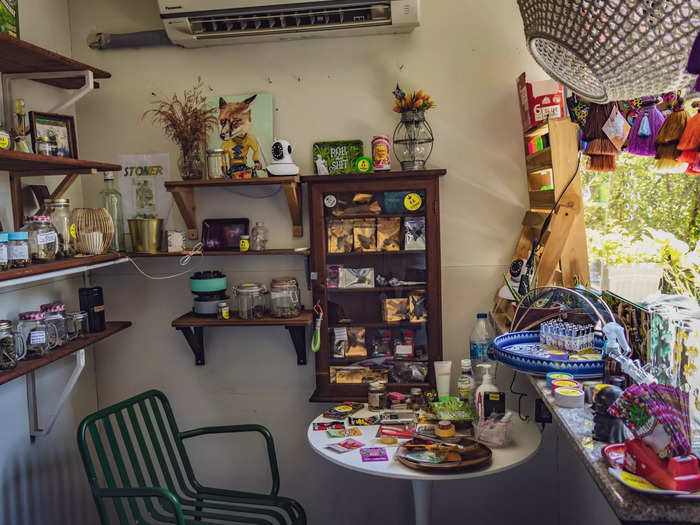
Chayakul's marijuana products start from 450 baht, or $13. Unlike other shops in Chiang Mai, he doesn't source cannabis locally. He prides himself in bringing the "California quality" to Chiang Mai for stoners who "know their stuff."
"I think it's not just in Chiang Mai — people love to consume cannabis worldwide," Chayakul said.
Before borders closed in 2020, Chayakul traveled to Europe and the US, searching for "only the best weed" — and trying it for himself. He claims that his weed is "special" and isn't sold anywhere else in Chiang Mai.
"Weed is like wine," Chayakul said. "Every night, we have to taste our weed so we can communicate to our customers and know exactly what they want."
Chayakul's dispensary is just one of more than 220 marijuana businesses in Chiang Mai, according to the Thai database WEED.IN.TH. While the marijuana tourism industry is flourishing in the city, a lot of uncertainty still remains.
Regulations on marijuana are still loosely enforced, a local expert told the Bangkok Post. Still, Thai authorities have pushed to tighten up the rules — but for now, these entrepreneurs are still eager to keep up with their customers' demand for the ever-controversial plant.
Popular Right Now
Popular Keywords
Advertisement